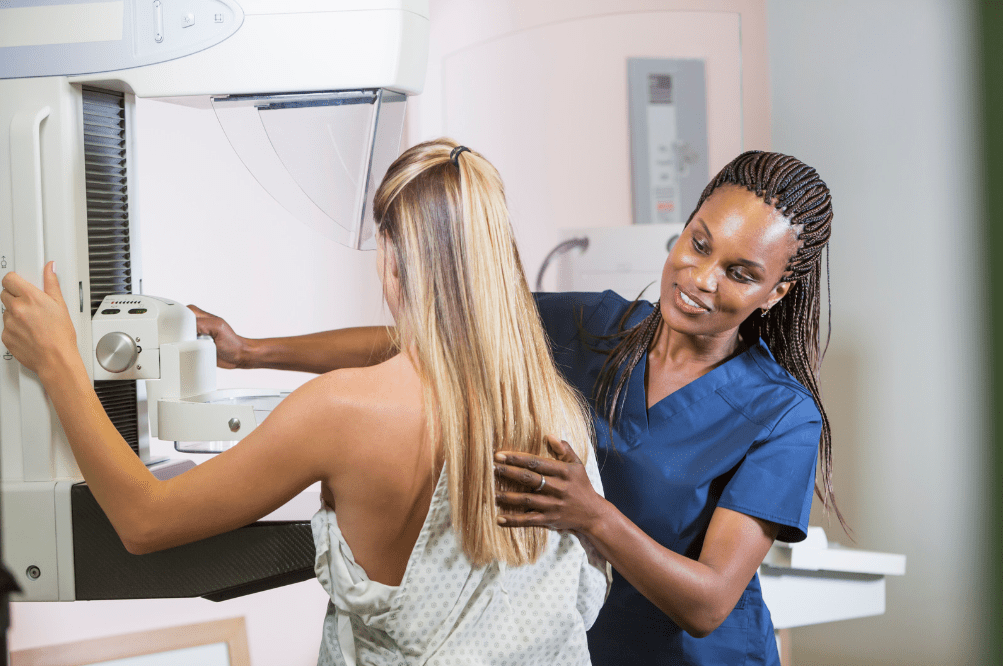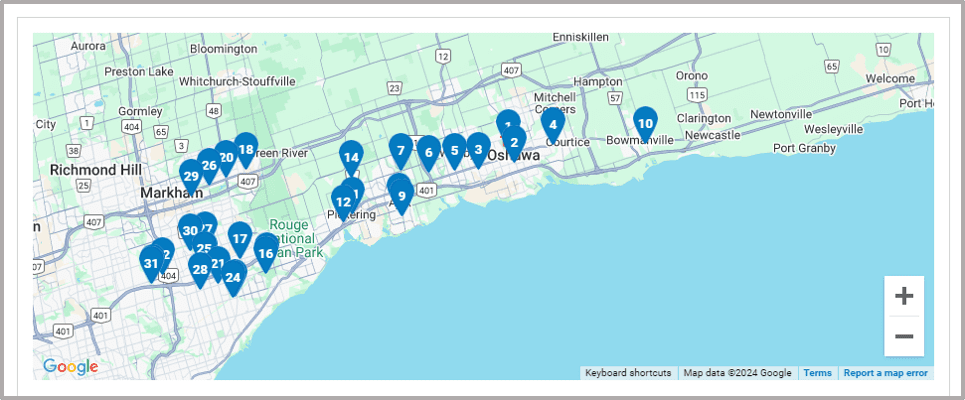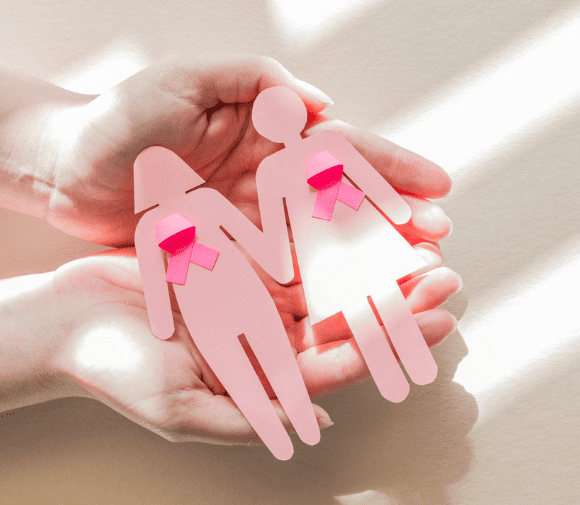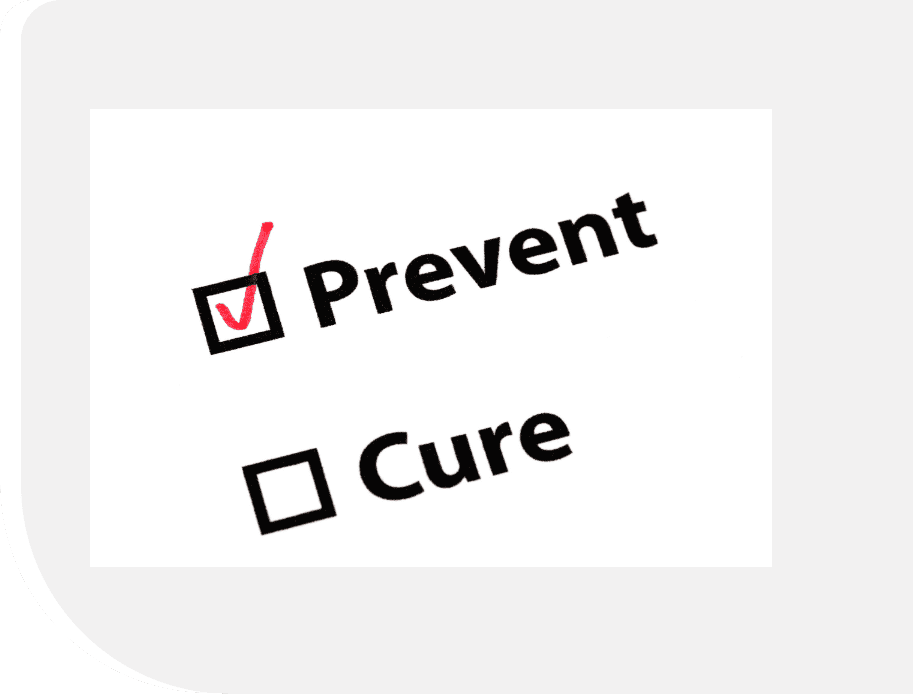
Ontario Breast Cancer Screening Program
Breast cancer is one of the most common cancers for women in Ontario. 1 in 9 women will receive a breast cancer diagnosis in her lifetime.
People ages 40 to 74 have a lower risk of dying from breast cancer when they are screened regularly with mammograms. Screening can find breast cancers when they are small, less likely to have spread and more likely to be treated successfully.
Breast Cancer Screening for People with an Average Risk (no family or personal history of breast cancer)
Your age and family medical history helps determine when you should get screened.
If you are between 40 to 74 years of age, the Ontario Breast Screening Program (OBSP) recommends you have a mammogram every 2 years.
You do not need a referral from a doctor or nurse practitioner to schedule a mammogram. Call 1-800-668-9304 to schedule your mammogram. You can also choose to call one of the Breast Screening Programs listed below.
Your mammogram may indicate that you have dense breasts. To learn about breast (chest) density, how you can find out your density, how density can affect your health and recommendations for screening (checking) your breast (chest) density visit: Cancer Care Ontario

Breast Cancer Screening Wait Times and Location Tool
Click here to access the Ontario Wait Time Reporting Website: An online tool that helps find local OBSP sites and approximate wait times for mammography screening

Ontario Breast Screening Program Locations in the Central East Region
| City/Town | Name of Clinic & Address | Hours of Operation | Phone Number | Booking Appointment Details | |
|---|---|---|---|---|---|
| Ajax | Durham Radiology Associates 95 Bayly Street West, Suite 101 Ajax, ON, L1S 7K8 | Mon to Thur: 8AM - 4PM | 905-428-0444 | ||
| Ajax | Lakeridge Health - Ajax 580 Harwood Avenue South Ajax, ON, L1S 2J4 | Mon to Fri: 8AM-3PM | 905-721-4717 | ||
| Ajax | Rossland Diagnostic Clinic 300 Rossland Road East, Unit 102, Ajax, ON L1Z 0M1 | Mon to Fri: 8AM-5PM | 905-426-3111 | https://rosslandic.ca/services/mammography/ | |
| Bowmanville | Lakeridge Health - Bowmanville 47 Liberty Street South Bowmanville, ON L1C 2N4 | Mon, Wed, Thur: 8AM-4PM Tue: 8AM-11AM Thur: 8AM-8PM | 905-623-3331 ex. 27009 | ||
| Campbellford | Campbellford Memorial Hospital 146 Oliver Road Campbellford, ON K0L 1L0 | Tue & Thur: 8:30AM-3:30PM | 705-653-3104 | ||
| Cobourg | Northumberland Hills Hospital 1000 DePalma Drive Cobourg, ON K9A 5W6 | Mon to Fri: 7AM-4PM | 905-377-7795 | ||
| Courtice | Courtice Imaging Centre 1450 Highway #2 Courtice, ON L1E 3C3 | Mon to Fri: 8AM-4PM | 905-721-4932 | ||
| Lindsay | Ross Memorial Hospital 10 Angeline Street North Lindsay, ON K9V 4M8 | Mon to Fri: 8AM-4PM | 705-328-6175 | https://search.caredove.com/service/27473/request | |
| Oshawa | Lakeridge Health Oshawa 1 Hospital Court Oshawa, ON L1G 2B9 | Mon, Wed, Fri: 8AM-3:30PM Tue & Thur: 8AM-7:45PM | 905-721-4717 | ||
| Oshawa | Impexxus Medical Imaging - Oshawa 11 Gibb Street Oshawa, ON, L1H 2J9 | Mon & Thur: 9AM-5PM | 905-579-1445 | https://www.impexxus.ca/Request-Appointment | |
| Pickering | WELL Health Diagnostic Centres - Pickering 1105 Kingston Road, Suite D202 Pickering, ON L1V 1B5 | Mon to Fri: 8:30AM-4:30PM | 905-420-3068 | ||
| Pickering | Pickering Diagnostic Imaging Centre 1885 Glenanna Road, Unit 106 Pickering, ON L1V 6R6 | Mon to Fri: 9AM-5PM | 905-831-2255 | https://www.pickeringimaging.com/booking-calendar/mammography-1?category=1b94d9fb-ce03-4194-8340-8b0d63eeaaf9&referral=service_list_widget | |
| Pickering | EXR Medical Imaging - Pickering 1690 Dersan Street, Suite 130 Pickering, ON L1V 2P8 | Mon, Tue, Fri: 9AM-4PM | 905-839-1806 | https://exr.ca/appointments/ | |
| Peterborough | Peterborough Regional Health Centre 1 Hospital Drive Peterborough, ON K9J 7C6 | Mon to Fri: 8AM-4PM | 705-740-8166 | ||
| Peterborough | The Medical Centre 707 Charlotte Street Peterborough, ON K9J 7B3 | Mon & Tue: 8AM-4PM Wed & Thur: 8:30AM-4:30PM Fri: 8:30AM-3PM | 705-876-4505 | ||
| Port Hope | Bluewater Imaging - Port Hope X-Ray & Ultrasound 249 Ontario Street Suite 110 Port Hope, ON, L1A 3Y9 | Mon to Sunday: 8AM-3:30PM | 905-885-9839 | ||
| Port Perry | Port Perry Imaging 462 Paxton Street Port Perry, ON, L9L 1L9 | Tue to Fri: 8AM-4PM | 905-985-9727 | ||
| Scarborough | Alton Towers X-Ray and Ultrasound 240 Alton Towers Circle, Suite 203A Scarborough, ON, M1V 4P3 | Mon to Saturday: 9AM-5PM | 416-792-6314 | ||
| Scarborough | East End Breast Imaging 4002 Sheppard Ave E. Unit 204 Scarborough, ON, M1S 1S6 | Mon to Fri: 9AM-4PM | 416-299-9895 | ||
| Scarborough | Ellesmere X-Ray 2880 Ellesmere Road Scarborough, ON, M1E 4B8 | Montday to Fri: 9AM-4PM | 416-284-1697 | https://exr.ca/appointments/ | |
| Scarborough | Lighthouse Medical Imaging - Finch 4168 Finch Ave. East, G18 Scarborough, ON M1S 5H6 | Mon, Tue, Fri: 8:20AM-4PM Wed & Thur: 8AM-4:30PM | 416-293-5940 | ||
| Scarborough | Quantum Medical Imaging Services Inc. 2330 Kennedy Rd Suite 402 Scarborough, ON, M1T 0A2 | Mon, Tue, Thur, Fri: 8AM-4PM Wed: 9AM-4PM Saturday: 8AM-12PM | 416-756-7667 | ||
| Scarborough | Scarborough Health Network - Birchmount 3030 Birchmount Road, Scarborough, ON, M1W 3W3 | Tue, Wed, Thur, Saturday: 7:30AM-3:30PM | 416-431-8167 | ||
| Scarborough | Scarborough Health Network - Centenary 2867 Ellesmere Rd. Scarborough, ON, M1E 4B9 | Mon to Thur: 7:30AM-5PM Fri: 7:30AM-4PM Saturday: 7:30AM-3:30PM | 416-431-8167 | ||
| Scarborough | Scarborough Health Network - General Site 3050 Lawrence Avenue. E., Scarborough, ON, M1P 2V5 | Mon to Thur: 7:30AM-5PM Fri and Saturday: 7:30AM-3:30PM | 416-431-8167 | ||
| Scarborough | Scarborough Radiologists 3000 Lawrence Ave. East, Suite G03 Scarborough, ON, M1P 2V2 | Mon to Fri: 8AM-4PM | 416-438-6636 | https://scarboroughradiologists.com/#booking | |
| Scarborough | Scarborough Women's Imaging Centre 2025 Midland Avenue. Suite 200 Scarborough, ON, M1P 3E2 | Mon & Wed: 8AM-2:30PM Thur & Fri: 8AM-4PM | 416-296-1911 | https://ocean.cognisantmd.com/intake/IntakePortal.html?eReqRef=c83d9a5a-8a1b-4545-b143-b0c2bdc4a243 | |
| Scarborough | True North Imaging - Sheppard Diagnostic Imaging 1780 Markham Rd, Unit 5 Scarborough, ON, M1B 2W2 | Mon to Fri: 8AM-4PM | 416-291-4770 | https://truenorthimaging.com/request-appointment/ | |
| Scarborough | VPM Imaging 520 Ellesmere Rd, Lower Level Scarborough, ON, M1R 4E6 | Mon to Fri: 8AM-5PM Saturday & Sunday: 8AM-6:30PM | 416-759-3462 | https://vpmimaging.com/services/mammography/#appointment | |
| Uxbridge | Oak Valley Health - Uxbridge Hospital 4 Campbell Drive, Uxbridge, ON, L9P 1S4 | Mon, Tue, Thur: 8:15AM-3:30PM | 905-852-9771 x5249 | ||
| Whitby | Impexxus Whitby Medical Arts Imaging 1615 Dundas Street East Whitby, ON L1N 2L1 | Mon, Tue: 9:15AM-4:30PM Wed, Thur, Fri: 9:30AM-4:30PM | 905-576-9729 | https://www.impexxus.ca/Request-Appointment | |
| Whitby | GNMI - Whitby 200 Brock Street North Whitby, ON L1N 4H5 | Mon & Thur: 8:30AM-3PM | 905-666-4206 | https://www.gnmi.ca/appointments-2/ | |
| Whitby | Whitby Health Centre 198 Des Newman Blvd Whitby, ON L1P 0P9 | Mon to Fri: 8AM-3:45PM | 905-721-3588 |

Breast Cancer Screening for People with a High Risk (Family or Personal History of Breast Cancer)
If you are between 30 to 69 years of age and meet any of the following requirements, talk to your healthcare provider about a referral to the High Risk Ontario Breast Screening Program:
- You are known to have a gene change (mutation) that increases your risk for breast cancer (e.g., BRCA1, BRCA2, TP53, PTEN, CDH1).
- You have a first-degree family member (parent, sibling or child) who has a gene mutation that increases their risk for breast cancer (example: BRCA1, BRCA2, TP53, PTEN, CDH1).
- You have a personal or family history of breast, ovarian, prostate, or pancreatic cancer.
- You have had radiation therapy to the chest to treat another cancer or condition (example: Hodgkin Lymphoma) before age 30 and at least 8 years ago.
Your healthcare provider will be able to help determine if you are eligible for the high-risk breast screening program or if your genetic testing is necessary to better understand your risk of developing breast cancer.
What You Can Do to Lower Your Risk of Breast Cancer
Limit the amount of alcohol you drink: If you regularly have 1 alcoholic drink every day you increase your risk of getting breast cancer by 10%. To reduce your risk of any cancer, it is better to not drink alcohol at all. There is no safe amount to drink when it comes to breast cancer risk. If you choose to drink alcohol, keep your risk as low as possible by having no more than 2 drinks of alcohol a week. The less alcohol you drink, the more you reduce your cancer risk.
Maintain a healthy body weight: A high body weight can increase your risk of some cancers. Working towards or keeping your best body weight can improve your overall health and reduce your risk of cancer.
Be physically active: Low levels of physical activity may increase your risk of some cancers. People of all body weights can benefit from physical activity. Physical activity has many health benefits, even without weight loss. Be physically active for at least 20 to 30 minutes each day, if possible. You can do this by completing 10 minutes of activity at a time.
Talk to your family doctor or nurse practitioner about the benefits and risks of birth control pills and hormone replacement therapy: Taking birth control pills or hormone replacement therapy to help with symptoms of menopause may increase your risk of breast cancer.
Pregnancy and breast-feeding: Being pregnant and giving birth may lower your risk of getting breast cancer. Breastfeeding for 1 year or more may also lower your breast cancer risk.

